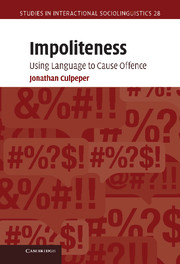Book contents
- Frontmatter
- Contents
- List of figures and tables
- Preface
- Introducing impoliteness
- 1 Understanding impoliteness I: Face and social norms
- 2 Understanding impoliteness II: Intentionality and emotions
- 3 Impoliteness metadiscourse
- 4 Conventionalised formulaic impoliteness and its intensification
- 5 Non-conventionalised impoliteness: Implicational impoliteness
- 6 Impoliteness events: Co-texts and contexts
- 7 Impoliteness events: Functions
- 8 Conclusions
- Notes
- References
- Index
3 - Impoliteness metadiscourse
Published online by Cambridge University Press: 16 May 2011
- Frontmatter
- Contents
- List of figures and tables
- Preface
- Introducing impoliteness
- 1 Understanding impoliteness I: Face and social norms
- 2 Understanding impoliteness II: Intentionality and emotions
- 3 Impoliteness metadiscourse
- 4 Conventionalised formulaic impoliteness and its intensification
- 5 Non-conventionalised impoliteness: Implicational impoliteness
- 6 Impoliteness events: Co-texts and contexts
- 7 Impoliteness events: Functions
- 8 Conclusions
- Notes
- References
- Index
Summary
Introduction
One way in which the impoliteness definitions given in Section 1.1 vary is in the label they use to refer to impoliteness phenomena. The studies pertaining to definitions (2), (3) and (9) use rude/rudeness rather than impolite/impoliteness. Furthermore, as can be seen from quotations (10) to (13), outside linguistic pragmatics other terms are used, such as communicative aggression. Indeed, in everyday life a myriad of terms are encountered, including bitchy, mean, uncivil, disrespectful, ill-mannered, cheeky, brusque and discourteous. Clearly, all these terms refer to behaviours that are antisocial in some way, but equally clearly there are nuances of difference amongst them. A particular aim of this chapter is to understand the meanings of such terms, and thereby gain some insight into impoliteness, its characteristics and dimensions. This approach to understanding the meaning of impoliteness by examining terms referring to it echoes the agenda of the ‘post-modern’ or ‘discursive’ approach. Studies espousing this approach criticise classic politeness theories for articulating a pseudo-scientific theory of particular social behaviours and labelling it politeness (so-called politeness2), whilst ignoring the lay person's conception of politeness as, for example, revealed through their use of terms such as polite and politeness to refer to particular social behaviours (so-called politeness1) (e.g. Eelen 2001; Locher and Watts 2005; Watts 2003). Politeness, they argue, is a notion that is constructed and contested in discourse, and looking at those constructions and contexts will provide a firmer ontological basis for politeness studies than has been the case hitherto.
- Type
- Chapter
- Information
- ImpolitenessUsing Language to Cause Offence, pp. 71 - 112Publisher: Cambridge University PressPrint publication year: 2011



